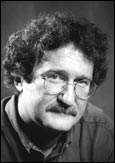Kosovo: A Report from the Field
Panelist Shares Eyewitness Account of Balkan War
By Fernando Quintero, Public Affairs
Posted May 12, 1999
 Eric Stover. |
Stover, adjunct professor of Public Health, was one of four panelists who spoke at Alumni House May 6 on the humanitarian, political and social consequences of the conflict in Yugoslavia.
Although the atrocities committed against refugees by Serbian military and police have been well documented in the press, Stover underscored the inhumanity of the situation with his personal report from the field.
"One day, we saw 23,000 refugees cross the border into Albania," recalled Stover, who recently interviewed refugees at the Kosovo border on behalf of Human Rights Watch. "I asked them, 'What did you feel when you crossed the border?' The most common answer was 'humiliation.'"
Through an interpreter -- a young woman who had been shot and wounded by Serbian police -- Stover spoke with dozens of refugees. Some had lived for months in hiding, enduring malnutrition and illness. There were reports of executions by the hundreds. Many refugees were hauled off their carts and killed while trying to flee Kosovo.
Cases of rape were also reported. Stover recounted one incident in which Serbian troops separated women into three different buildings, where they were forced to cook for troops, then raped.
At check points, Stover said, Serb police have been detaining and stealing from "deportees," as he called them. Some have been forced to surround NATO targets to act as human shields against air bombardment.
And while the violence in Kosovo continues, livestock is being destroyed and the planting season is being passed up. "The effects of what's going on in Yugoslavia will last for years to come," Stover predicted.
Panelist Kate Jastram Balian, a visiting lecturer at Boalt Hall and a member of the United Nations High Commission on Refugees, presented a number of sobering statistics: Half of the refugees are under age 6; ten percent are over 60; and more than 60 percent are women.
"This is an extremely vulnerable, traumatized caseload," she said.
Other panelists at the event, which drew a standing room-only crowd, discussed the foreign policy implications of the crisis. Peter Tarnoff, former Undersecretary of State for Political Affairs, supports international intervention.
"The first lesson learned," he said, "is that you can't wait for things to get better when ethnic cleansing is going on."
Tarnoff warned that "there will be more Kosovos in the future, anywhere where minorities are oppressed and the majority feels threatened."
Meanwhile, Mark Danner, staff writer for the New Yorker and a Human Rights Center fellow, called the current situation in Kosovo a "fiasco for NATO and American foreign policy" that had tested NATO's credibility.
"President Clinton said there were two goals for the war: protecting Kosovar Albanians and protecting U.S. vital interests," Danner said. "The means employed had nothing to do with ends. The means were bombings -- high-altitude bombings. The problem with this is you cannot protect people on the ground. There's a large contradiction here."
![]()
![]()
May 12 - June 8, 1999 (Volume 27, Number 34)
Copyright 1999, The Regents of the University of California.
Produced and maintained by the Office of Public Affairs at UC Berkeley.
Comments? E-mail berkeleyan@pa.urel.berkeley.edu.